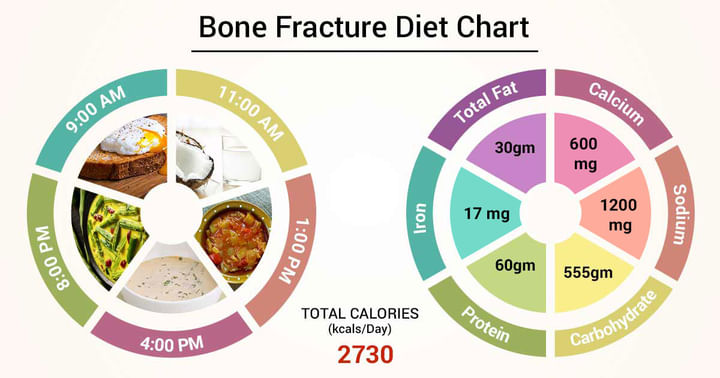Diet Chart For bone fracture
Last Updated: Jan 20, 2025
About
The storage area for calcium, structure of skeleton framework and the very element that helps us stand up against gravity, our bones, are sometimes vulnerable to fracture. The reasons are many that includes sudden shock or stress and sometimes even medical ailments. The recovery from bone fracture is very painful and with the help of an appropriate diet, one can speed up the recovery and get rid of all the restrictions on movement.
The key to diet for bone fracture is intake of nutrients. Calcium being the main component of bone, can be consumed in the form of yoghurt, green leafy vegetable, sea vegetables, milk, etc. Protein is essential to rebuild muscles. Therefore, intake of clean lean protein such as wild caught fish and grass fed beef will help the body to recover at a faster pace. Zinc contains the necessary chemicals which help to rebuild the bones. Spinach, pumpkin seeds, beef, etc are zinc rich food.
A holistic diet for brain fracture comprises of not just food to include but also food to stay away from. Salt must be reduced to the maximum extent possible from our diet because it reduces the calcium content in bones and weakens them further. Caffeine, alcohol, sugar and processed food must also be kept away from the diet.
Diet Chart
| Sunday | |
| Breakfast (8:00-8:30AM) | Poached Egg(2) + Toast (2 slices) + Green Tea(1 cup) with Honey(1tsp) + 2 Cashew nuts + 5-6 Almonds + 3-4 Raisins |
| Mid-Meal (11:00-11:30AM) | Tender coconut water (1/2 cup) + 1 Kiwi |
| Lunch (2:00-2:30PM) | 2 Chapati + Malabar Spinach n Pumpkin curry (1/2 cup) + Raita (1/3rd cup) |
| Evening (4:00-4:30PM) | Kale n Spring onion soup (1/2 cup) |
| Dinner (8:00-8:30PM) | Parboiled Rice (1/2 cup) + Potato n Drumstick curry (1/3rd cup) |
| Monday | |
| Breakfast (8:00-8:30AM) | Oats n Milk (1/2 cup) + 2 Cashew nuts + 5-6 Almonds + 3-4 Raisins |
| Mid-Meal (11:00-11:30AM) | Tender coconut water (1/2 cup) + 1 Custard Apple |
| Lunch (2:00-2:30PM) | 2 Chapati + Sardine Fish Curry (1/2 cup) + Roasted papad (1) |
| Evening (4:00-4:30PM) | Rice Flakes chat (1/2 cup) + Green Tea (1 cup) |
| Dinner (8:00-8:30PM) | 2 Chapati + Mix Veg. (1/3rd cup) |
| Tuesday | |
| Breakfast (8:00-8:30AM) | Thai Mushroom soup (1 cup) + 2 Cashew nuts + 5-6 Almonds + 3-4 Raisins |
| Mid-Meal (11:00-11:30AM) | Tender coconut water (1/2 cup) + 1 Orange |
| Lunch (2:00-2:30PM) | 2 Chapati + Palak Paneer (1/2 cup) |
| Evening (4:00-4:30PM) | Boiled Corn n Carrot Chat (1/2 cup) + Green Tea (1 cup) |
| Dinner (8:00-8:30PM) | Mashed Rice (1/2 cup) + Milk (1/3rd cup) + Jaggery (2 tsp) |
| Wednesday | |
| Breakfast (8:00-8:30AM) | Steamed Brussel sprouts n Spring Onions (1/2 cup) + Green Tea(1 cup) with Honey(1tsp) + 2 Cashew nuts + 5-6 Almonds + 3-4 Raisins |
| Mid-Meal (11:00-11:30AM) | Tender coconut water (1/2 cup) + 2 Dates |
| Lunch (2:00-2:30PM) | 2 Chapati + Mustard Greens (1/2 cup) + Raita (1/3rd cup) |
| Evening (4:00-4:30PM) | Mur-mure Chat (1/2 cup) + Green Tea (1 cup) |
| Dinner (8:00-8:30PM) | 2 Chapati + Baked Beetroot n Carrot (1/3rd cup) |
| Thursday | |
| Breakfast (8:00-8:30AM) | Scrambled Eggs with Baked Tomato (1/2 cup) + Green Tea(1 cup) with Honey(1tsp) + 2 Cashew nuts + 5-6 Almonds + 3-4 Raisins |
| Mid-Meal (11:00-11:30AM) | Tender coconut water (1/2 cup) + 1 Custard Apple |
| Lunch (2:00-2:30PM) | 2 Chapati + Watercress curry (1/2 cup) + Roasted Papad (1) |
| Evening (4:00-4:30PM) | Veg. Uthappam (1) + Green Tea (1 cup) |
| Dinner (8:00-8:30PM) | Parboiled Rice (1/2 cup) + Fish(1pcs) stew (1/3rd cup) |
| Friday | |
| Breakfast (8:00-8:30AM) | Broccoli with Spring Onions n Mushroom soup (1 cup) + 2 Cashew nuts + 5-6 Almonds + 3-4 Raisins |
| Mid-Meal (11:00-11:30AM) | Tender coconut water (1/2 cup) + 1 Orange |
| Lunch (2:00-2:30PM) | 2 Chapati + Rajma (1/2 cup) + Raita (1/3rd cup) |
| Evening (4:00-4:30PM) | Boiled Corn n Carrot Chat (1/2 cup) + Green Tea (1 cup) |
| Dinner (8:00-8:30PM) | Khichdi (1/2 cup) + Baked Potato (1/3rd cup) |
| Saturday | |
| Breakfast (8:00-8:30AM) | Sprouts (1/2 cup) + Green Tea(1 cup) with Honey(1tsp) + 2 Cashew nuts + 5-6 Almonds + 3-4 Raisins |
| Mid-Meal (11:00-11:30AM) | Tender coconut water (1/2 cup) + 2 Dates |
| Lunch (2:00-2:30PM) | 2 Chapati + Paneer curry (1/2 cup) |
| Evening (4:00-4:30PM) | Rice Flakes chat (1/2 cup) + Green Tea (1 cup) |
| Dinner (8:00-8:30PM) | 1.5 Chapati + Milk (1/3rd cup) + Jaggery (2 tsp) |
Food Items To Limit
The food stuffs that limit calcium absorption should be limited.
- Phytates: Found in nuts, seeds and grains. They easily bind to calcium therefore limiting its availability for absorption. Try not to eat phytate-containing foods and dairy foods together. Oxalates: Found in sweet potatoes, rhubarb, spinach and beetroot. Very reactive molecules. Bind to calcium therefore reducing its absorption. Interfere with calcium storage in cells. Don’t eliminate these food just be aware that they are not the best providers of calcium.
- Alcohol: Interferes with vitamin D activation by the liver and kidneys. Inhibits vitamin D activating enzymes in the liver. It is a diuretic therefore it increases calcium excretion through urine. Increases Parathyroid hormone (PTH) levels and therefore decreases calcium reserves in the body. Try to limit your alcohol intake.
- Caffeine: Mostly present in tea and coffee. Drinking more than 3 cups of tea or coffee per day seems to decrease calcium absorption. It is believed that caffeine decreases calcium absorption by interfering with vitamin D absoprtion. This area is still being researched. Caffeine is also a diuretic therefore it increases calcium excretion in the urine.
Do's And Dont's
Do's:
- Include high calcium rich foods (beans, milk, cheese, tofu, fish, dry fruits)
Don'ts:
- Avoid consumption of caffeinated products.
- Limit the intake of phosphorus containing foods- meat, soft drinks.
- Never consume Iron rich foods along with calcium rich foods as that might lead to malabsorption.
- Foods with high levels of oxalic acid such as spinach, collard greens, sweet potatoes, rhubarb and beans prevent calcium absorption. So don't consume calcium rich foods along with these foods.
Food Items You Can Easily Consume
- Cereals & cereal products: Ragi, bajra, whole wheat flour. Pulses & Legumes: Lentils, peas, kidney beans, chickpeas, toor daal, soy beans.
- Fruits & Vegetables: Custard apples, chikus, apple, white jamun, grapes, lemons, oranges, raw mangoes, carrots, beetroots, bottle gourd, bitter gourds, spinach, Indian spinach, colocasia, drumsticks, yam, taro, tapioca, coriander leaves, celery, spring onions, garlic, ginger.
- Milk & milk products: Milk liquid, curd, cottage cheese, ghee, lassi, custard.
- Meat, Fish & Poultry: Sweet and salt water fishes (especially beneficial if taken with bones), eggs, Chicken (lean and/or fowl).
- Nuts & Oils: Almonds, raisins, pista, walnuts, vegetable oil, mustard oil.
References
- Cashman KD. Diet, nutrition, and bone health. The Journal of nutrition. 2007 Nov 1;137(11):2507S-12S. [Cited 30 June 2019]. Available from:
- Elmali N, Ertem K, Ozen S, Inan M, Baysal T, Güner G, Bora A. Fracture healing and bone mass in rats fed on liquid diet containing ethanol. Alcoholism: Clinical and Experimental Research. 2002 Apr;26(4):509-13. [Cited 30 June 2019]. Available from:
- Copp DH, Greenberg DM. Studies on bone fracture healing: I. Effect of vitamins A and D. The Journal of Nutrition. 1945 Apr 1;29(4):261-7. [Cited 30 June 2019]. Available from:
Table of content
Find Dietitian/Nutritionist near me
Ask a free question
Get FREE multiple opinions from Doctors



